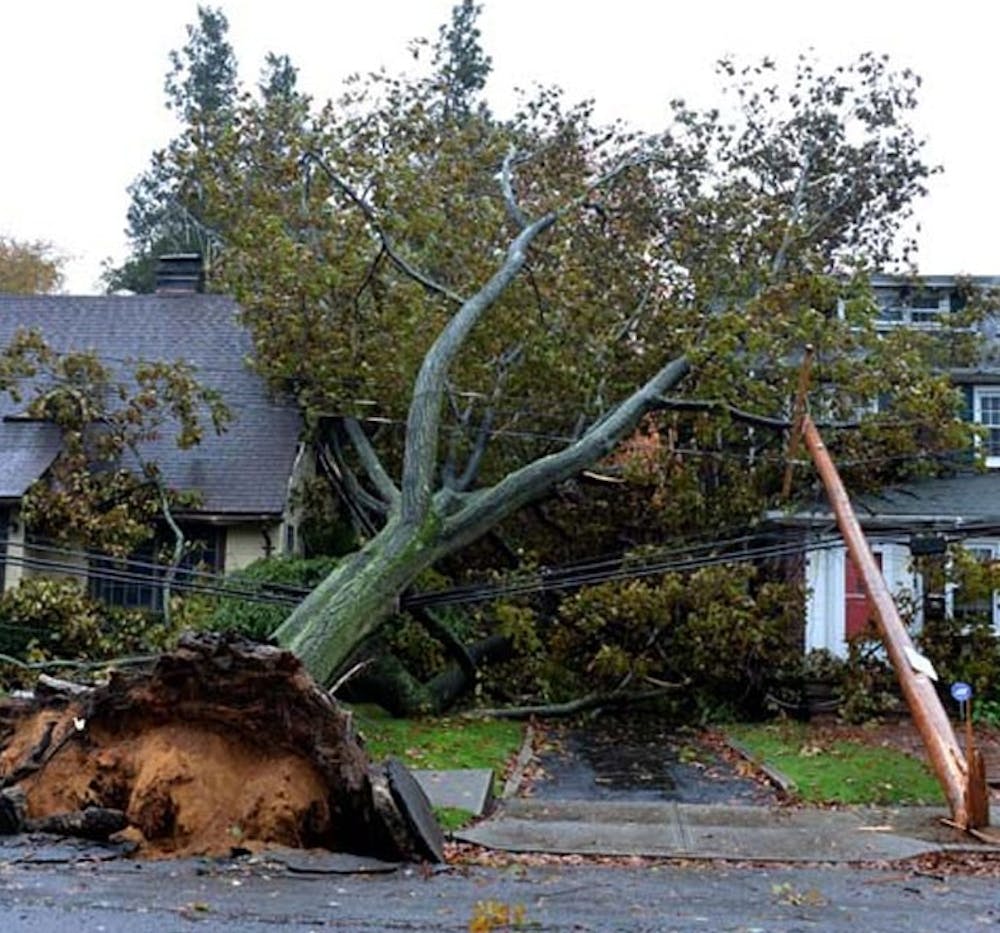Hurricane Sandy is on track to collide with cold air from the Arctic and a storm from the west, affecting the Midwest, a Chicago Tribune article reported.
For today, the National Weather Service has issued a high wind warning from 7 a.m. to 7 p.m. for Lake and Porter counties in Indiana.
The storm has affected much of the East Coast already, knocking out electricity to more than 1 million people Monday. Storm damage is projected at $10 billion to $20 billion, The Associated Press reported, potentially being one of the costliest natural disasters in U.S. history.
Despite this, analysts who cover the insurance industry told the AP they expected the losses to be manageable.
Hurricane Sandy has already killed 69 people in the Caribbean before making its way up the East Coast.
The New York Stock Exchange closed Monday and today because of the storm and intends to reopen Wednesday. The last time the exchange was closed for weather was in 1985, the year of Hurricane Gloria. The exchange has not been closed for two consecutive days because of weather since 1888.
Sandy also has caused several major U.S. companies to postpone quarterly earnings reports, which were originally scheduled for Monday and today.
Also in New York, officials have shut down tunnels, Broadway and mass transit.
Julie Paulauski, who graduated from Ball State in 2011, now lives in Brooklyn, N.Y. She said there have been high winds in her area and the power has flickered.
The subways shut down at 7 p.m. Sunday, so Paulauski said everyone has had to plan ahead. She has had to work from home since Monday because her office is closed.
“No one can get in or out of the city because not only are the subways messed up, but a lot of the tunnels and bridges [are too],” Paulauski said.
Paulauski said she was in Manhattan, N.Y., on Sunday trying to buy flashlights and batteries to prepare for the storm, but there were long lines and the flashlights were sold out.
Former Gov. Mitt Romney has canceled several campaign events today because of the storm. His campaign staff in Virginia has collected donations for victims and Romney has asked those in the hurricane’s path to remove yard signs, as they could become dangerous debris during the storm.
President Barack Obama has also canceled some of his campaign events.
The storm has caused the cancellation of nearly 12,500 flights Monday and today, the AP reported.
Because the storm will keep drivers off the road and will cause businesses to close, oil prices fell Monday. The AP reported the biggest refineries in the Northeast have shut down or throttled back sharply.
The only ones rejoicing in the impact of Hurricane Sandy are high school seniors, as several colleges have extended their deadlines for early decision, early action or priority rounds. The original deadline for the applications was Nov. 1.
Matt Houston, who graduated from Ball State in 2010, now lives in Gambrills, Md., and said he has experienced high winds of 35 mph.
He received an automated call Monday from the county, asking that everyone be off the roads by 6 p.m., Houston said.
“It’s pretty much been a regular thunderstorm most of the day, but as the sun went down, the winds started to pick up,” Houston said. “We’ve got some trees in the backyard that have started to sway and the leaves against the window almost sound like rocks.”
Houston said he learned from Hurricane Irene to buy a generator along with his flashlights and batteries to prepare for the storm.
Verizon spokesman John Bonomo told the AP that the network is performing normally, and the storm has not yet had any major effect.
In preparation for the storm, AT&T employees are adding portable generators to cell towers and checking on fuel levels, spokesman Mark Siegel told the AP.
Phone companies are recommending that text messages be used when Sandy hits because they use minimal network resources.
The ten most expensive U.S. hurricanes for insurance companies since 1970. The amount insurers pay out to policyholders is typically a fraction of the overall economic cost.
- Katrina, 2005, $74.7 billion
- Andrew, 1992, $25.6 billion
- Ike, 2008, $21.1 billion
- Ivan, 2004, $15.4 billion
- Wilma, 2005, $14.5 billion
- Rita, 2005, $11.6 billion
- Charley, 2004, $9.6 billion
- Hugo, 1989, $8.3 billion
- Frances, 2004, $6.1 billion
- Irene, 2011, $5.3 billion


